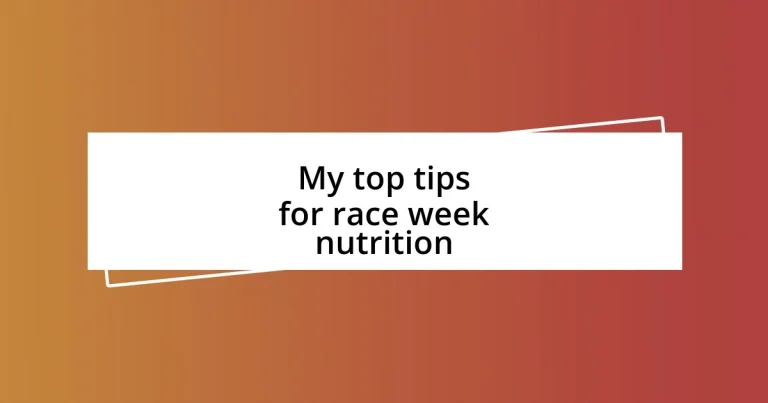Key takeaways:
- Race week nutrition involves careful planning of meals with a focus on balanced intake of carbohydrates, proteins, and healthy fats to optimize energy and performance.
- Hydration is key; consistent fluid intake and electrolyte balance are essential to avoid discomfort and enhance stamina during races.
- Post-race recovery should include immediate rehydration and nutrient-rich foods to aid recovery, with attention to micronutrients for overall nourishment.
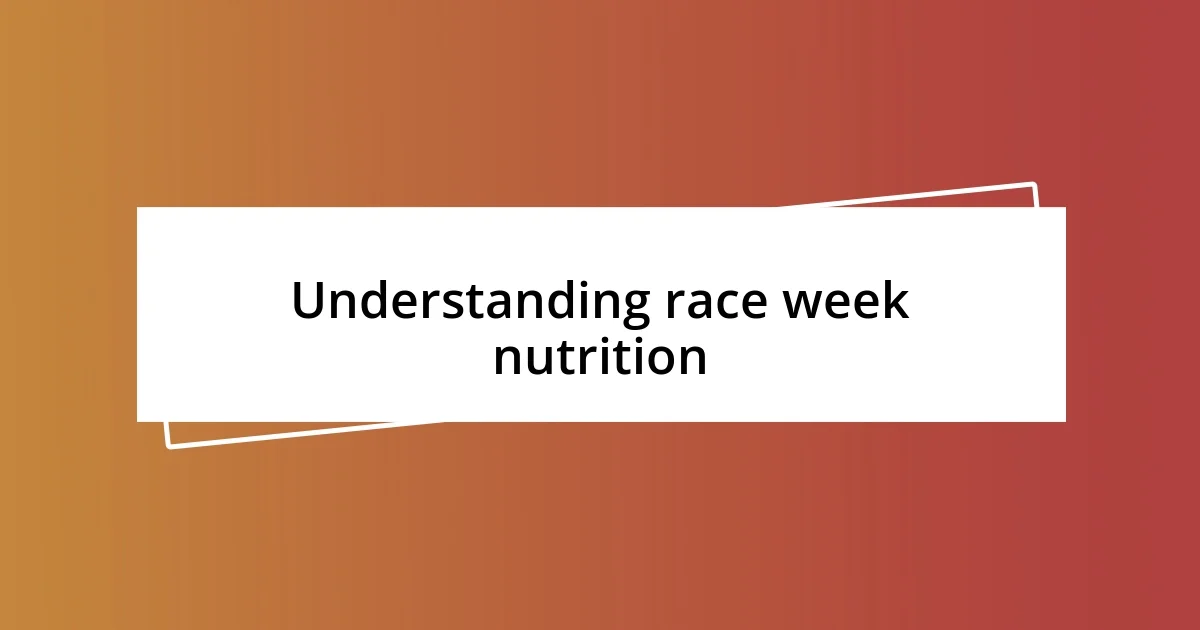
Understanding race week nutrition
Understanding race week nutrition is crucial for peak performance on the big day. When I was preparing for my first marathon, I learned that what I consumed during race week could significantly impact my energy levels and recovery. Have you ever experienced that nervous excitement leading up to a race? That’s when I realized how much what I ate could either fuel my confidence or leave me feeling sluggish.
As race week approaches, it’s all about finding the right balance. I remember adjusting my carb intake, slowly increasing it as the days counted down. This adjustment ensured my glycogen stores were full, making me feel like I could conquer any distance. How often do you think about the balance between carbs, proteins, and fats during this time? It’s a delicate dance, but with the right knowledge, it becomes second nature.
Hydration plays a vital role in race week too. I once underestimated it, leading to a frustrating race day headache. Now, I make a conscious effort to monitor my fluid intake consistently leading up to the race. Are you keeping track of your hydration? It’s amazing how something so simple can have such a profound impact on your performance.
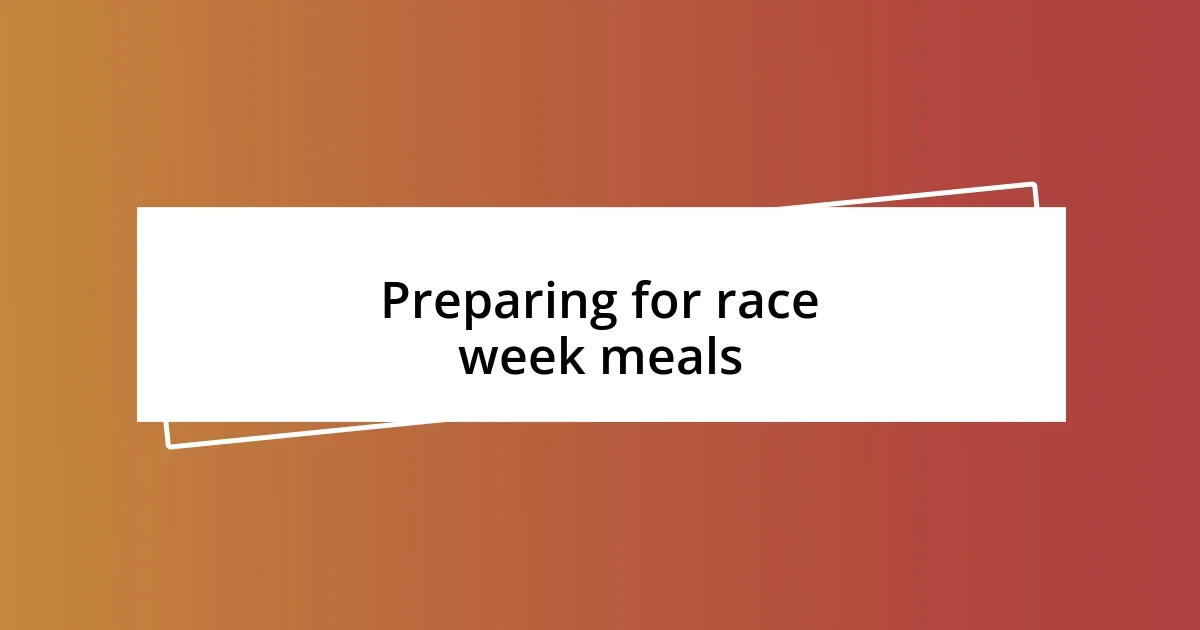
Preparing for race week meals
When I think about preparing my meals for race week, planning is key. I like to map out what I’ll eat for each day leading up to the race. It not only alleviates stress but also ensures I’m fueling my body correctly. Over the years, I’ve learned that the right meal can make me feel excited and energetic or sluggish and heavy. I vividly recall a race where I didn’t pay enough attention to my meals, opting for convenience instead. That experience taught me that each choice I make has a ripple effect on race day.
Here’s a quick checklist I follow to ensure I’m on the right track:
- Plan your meals: Outline breakfasts, lunches, and dinners, focusing on balanced nutrition.
- Prioritize complex carbohydrates: Think whole grains, oats, and sweet potatoes for sustainable energy.
- Include lean proteins: Chicken, fish, and legumes help with muscle repair.
- Incorporate healthy fats: Avocados and nuts provide essential nutrients without weighing me down.
- Avoid new foods: Stick to meals you know work well for you to prevent any surprises.
- Prep in advance: I often prepare meals in batches to save time and reduce pre-race stress.
- Stay alert to hydration: Don’t forget to balance meals with ample water intake throughout the day.
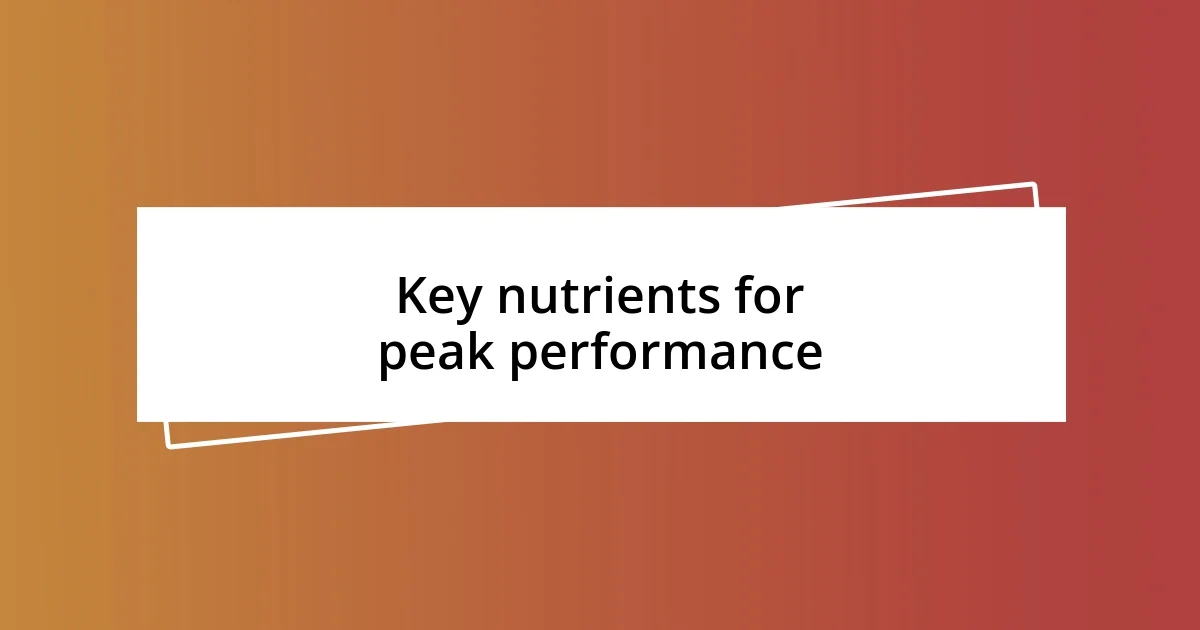
Key nutrients for peak performance
As race week approaches, focusing on specific nutrients can make a world of difference. I can’t stress enough the importance of carbohydrates; they truly are the body’s primary fuel source. During my last half marathon, I loaded up on pasta a couple of nights before, and I felt the energy surge on race day. Have you ever noticed how good carbs can make you feel when you’re well-fueled?
Protein is another key player, especially for muscle repair and recovery. In the past, I would overlook it, thinking it wasn’t as crucial during race week, but I’ve learned that including lean proteins such as chicken or tofu helps me recover faster. Ever experienced that satisfying feeling after a well-balanced meal? It’s like giving your body a high-five.
And let’s not forget about healthy fats. I’ve personally found that incorporating things like nuts or olive oil not only adds flavor but also supports energy levels without weighing me down. Sometimes, while snacking on a handful of almonds, I reflect on how these small choices support my overall performance.
| Nutrient | Role in Performance |
|---|---|
| Carbohydrates | Primary energy source and aids in glycogen storage |
| Protein | Supports muscle repair and recovery |
| Healthy Fats | Provides sustained energy and essential nutrients |

Hydration strategies for runners
One of the most crucial aspects of race week nourishment is staying properly hydrated. I’ve learned through experience that hydration isn’t just about chugging water the day before the race. It’s a continuous process that starts days in advance. Have you ever found yourself at the starting line feeling parched? I know that discomfort all too well. Ensuring that I’m sipping water consistently throughout the week helps me feel vibrant and ready to race.
I like to incorporate electrolyte drinks to maintain a balance of hydration and minerals. Just last month, I experimented with a blend of coconut water and a pinch of salt, which turned out to be a game-changer for my stamina during long runs. Have you tried anything like this? It’s fascinating how just a little boost can make a noticeable difference, keeping me refreshed and focused.
Furthermore, I always keep an eye on my urine color as a hydration gauge. It might sound strange, but I’ve found that a pale yellow means I’m well-hydrated. When I noticed a tinge of darker color before my last race, I adjusted and increased my fluid intake. As runners, we know our bodies pretty well, and small tweaks can lead to huge improvements on race day!

Meal timing and frequency essentials
Meal timing and frequency can significantly influence performance, especially in the lead-up to a race. I’ve found that eating smaller, more frequent meals helps me maintain consistent energy levels. For example, during my last race week, I made it a point to eat every three hours, which prevented those dreaded energy dips. Have you ever tried spreading your meals out? It might feel a bit unusual at first, but it can really help maintain your stamina.
One key aspect I’ve noticed is the importance of timing meals around workouts. I aim to have a mix of carbs and protein about an hour before a training run to ensure I’m adequately fueled. For instance, a banana with a spoonful of peanut butter has become my go-to pre-run snack. It’s not just about the nutrition; it’s almost like a ritual that gears me up mentally. How do you prepare before your runs?
Lastly, I believe that post-workout nutrition shouldn’t be overlooked. After putting in the miles, I always try to refuel within 30 minutes. I stick to a combination of protein and carbs, like a smoothie with spinach, banana, and some protein powder. It’s a quick and satisfying way to aid recovery and recharge my body. This approach has made a noticeable difference in how quickly I bounce back, and I often think about how a little planning can go a long way in my race prep. What changes might you consider to optimize your meal timing?

Snack ideas for energy maintenance
When it comes to energy maintenance, snacks play a pivotal role, especially during race week. I often reach for simple snacks that pack a punch, like a handful of almonds paired with dried cranberries. This combo provides not just quick energy but also a satisfying crunch that keeps my taste buds happy. Have you ever found that the right snack can boost your energy just when you need it? It’s one of those little joys that makes a difference in my training routine.
Another favorite of mine is rice cakes slathered with almond butter and banana slices. This combination is a great source of carbs and healthy fats, and it keeps me fueled without weighing me down. After a tough workout, it feels like a treat that replenishes my energy while indulging my cravings. I remember the first time I tried this snack; I was surprised by how much better I felt compared to my usual post-run snacks.
For something quick and portable, energy bars have become a staple in my race-week arsenal. I tend to lean towards those with natural ingredients, as they give me the energy boost I need without excessive sugar crashes. A few days before my last race, I experimented with homemade bars, containing oats, honey, and nuts, which not only tasted great but also kept my energy levels stable throughout long training runs. Have you thought about crafting your own snacks? It’s a fun way to take control of your nutrition and ensure you have exactly what your body needs.
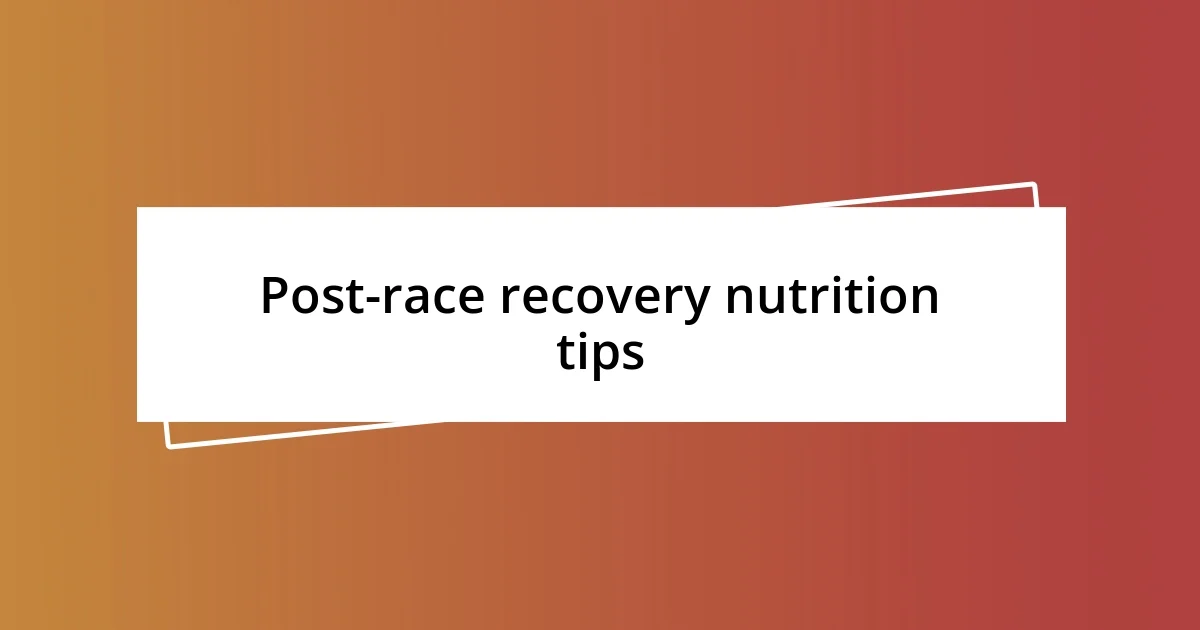
Post-race recovery nutrition tips
After crossing the finish line, I always focus on rehydrating and refueling immediately. The first thing I do is grab a recovery drink, which usually consists of chocolate milk or a smoothie loaded with berries. It’s incredibly satisfying to sip something cool and revitalizing, almost like a reward after putting in all that hard work. Have you ever noticed how much more you crave those delicious flavors right after a race?
Once I’ve managed the initial hydration, I turn my attention to solid foods rich in protein and complex carbs. A personal favorite is a quinoa salad with mixed vegetables and grilled chicken. I can’t stress enough how nourishing it is; the flavors meld together wonderfully while helping to restore my energy. In fact, preparing this meal becomes a joyful ritual for me, allowing me to reflect on the race while taking care of my body. What recovery meals do you lean towards when you finish a tough race?
Moreover, I pay keen attention to micronutrients to support my recovery. Incorporating colorful fruits and vegetables helps me replenish vitamins and minerals that I may have depleted during the race. Foods like spinach and blueberries are staples in my post-race recovery, as they not only provide essential nutrients but also taste great in a smoothie. It’s fascinating how something as simple as food can have such an emotional connection to my performance. How do you choose your recovery foods to nourish your body after a big race?












